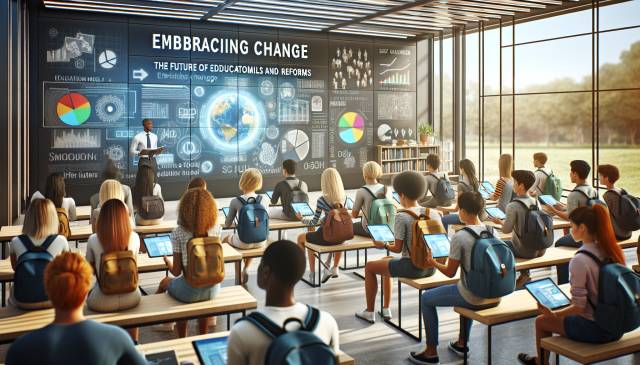
As we navigate through the 21st century, the landscape of education is undergoing significant transformations. Education policies and reforms play a crucial role in shaping the future of learning, impacting students, teachers, and educational institutions alike. This blog post delves into the importance of these changes and how they can enhance the educational experience for all.
The Need for Educational Reform
The call for education reform is not a new phenomenon; it has been a topic of discussion for decades. However, the pace of change is accelerating. Here are some key factors driving the need for reform:
- Technological Advancements: The rise of digital learning tools and platforms has transformed how we access information and interact with educational content.
- Global Competition: As economies become increasingly globalized, there is a heightened demand for a workforce equipped with diverse skills and knowledge.
- Changing Workforce Needs: Employers are looking for critical thinking, creativity, and adaptability in potential hires, leading to a reevaluation of curriculum priorities.
Key Areas of Focus in Education Reform
To effectively address these driving factors, education reforms often focus on several key areas:
- Curriculum Innovation: Updating curricula to include essential 21st-century skills such as digital literacy, problem-solving, and collaboration.
- Equity and Access: Ensuring all students have access to quality education, regardless of their socio-economic background or geographic location.
- Teacher Training and Support: Investing in professional development for teachers to equip them with the skills necessary to adapt to new teaching methods and technologies.
- Assessment and Accountability: Developing more comprehensive assessment methods that reflect students' overall growth and understanding, rather than just standardized test scores.
Innovative Approaches to Learning
One of the most exciting aspects of education reform is the introduction of innovative teaching methods and learning environments:
- Project-Based Learning: Encouraging students to engage in real-world problems fosters critical thinking and collaboration.
- Flipped Classrooms: In this model, students learn new content at home and engage in hands-on activities in the classroom, maximizing classroom interaction.
- Blended Learning: Combining traditional face-to-face instruction with online learning provides flexibility and personalized learning experiences.
The Role of Policy Makers
Education policies are crafted by a variety of stakeholders including government officials, educators, and community leaders. Policymakers play an essential role in:
- Funding Allocation: Determining how resources are distributed to schools and programs that need it the most.
- Legislative Support: Advocating for laws that support equitable education and innovative practices.
- Community Engagement: Involving parents and local communities in discussions about educational needs and priorities.
Challenges of Implementing Education Reforms
While the benefits of educational reform are apparent, there are challenges that must be addressed:
- Resistance to Change: Many educators and institutions may be hesitant to adopt new methods.
- Funding Limitations: Budget constraints can hinder the implementation of innovative programs.
- Equity Issues: Ensuring that reforms benefit all students equally can be a complex challenge.
Conclusion
The future of education lies in our ability to embrace change and adapt to the evolving needs of society. Education policies and reforms are critical to creating an equitable and effective learning environment. By fostering innovation, prioritizing teacher development, and engaging communities, we can pave the way for a brighter future in education.
As learners, it's essential to stay informed about these reforms and advocate for policies that enhance the educational experience. Together, we can contribute to shaping an education system that prepares us for the challenges ahead.
